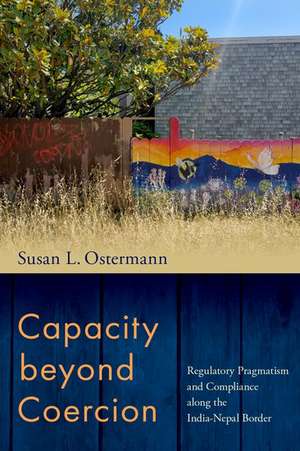Capacity beyond Coercion: Regulatory Pragmatism and Compliance along the India-Nepal Border: MODERN SOUTH ASIA SERIES
Autor Susan L. Ostermannen Limba Engleză Hardback – 22 dec 2022
Preț: 425.31 lei
Preț vechi: 544.65 lei
-22% Nou
Puncte Express: 638
Preț estimativ în valută:
81.41€ • 88.46$ • 68.43£
81.41€ • 88.46$ • 68.43£
Carte disponibilă
Livrare economică 20-26 martie
Preluare comenzi: 021 569.72.76
Specificații
ISBN-13: 9780197661116
ISBN-10: 0197661114
Pagini: 248
Dimensiuni: 238 x 163 x 21 mm
Greutate: 0.5 kg
Editura: Oxford University Press
Colecția OUP USA
Seria MODERN SOUTH ASIA SERIES
Locul publicării:New York, United States
ISBN-10: 0197661114
Pagini: 248
Dimensiuni: 238 x 163 x 21 mm
Greutate: 0.5 kg
Editura: Oxford University Press
Colecția OUP USA
Seria MODERN SOUTH ASIA SERIES
Locul publicării:New York, United States
Recenzii
Capacity beyond Coercion is essential reading for anyone interested in promoting effective conservation—or achieving any other critical regulatory policy—in developing nations. The world must protect its remaining forests, wetlands, and other sensitive ecosystems to counter climate change, preserve imperiled species, and stabilize declining environmental services. Yet high poverty levels in developing regions frequently push against conservation compliance, while countries often lack strong enforcement systems. Ostermann shows that nations need not increase coercion to boost compliance. As he demonstrates through a creative and convincing case study of bans on wood gathering in national forests at the border of Indian and Nepal, governments also can increase compliance by increasing legal understanding, reducing compliance costs, and delegating enforcement.
Notă biografică
Susan L. Ostermann is Assistant Professor of Global Affairs & Political Science in the Keough School of Global Affairs at the University of Notre Dame. She completed her PhD in the Travers Department of Political Science at the University of California, Berkeley. She also holds a law degree from Stanford Law School and worked for several years as a practicing litigator at O'Melveny & Myers LLP, focusing on class actions and intellectual property disputes. While Professor Ostermann's research focuses mainly on regulatory compliance in South Asia, she is broadly interested in understanding laws and norms and how they change and interact. Towards this end, she has published papers on inter-caste marriage and the role of skin color in Indian politics. She has also published work on compliance with anti-FGM/C law in Burkina Faso, Mali and Kenya, on the historical roots of conservatism in Indian political thought, the development and expansion of the Indian Election Commission, variation insex-ratios throughout the subcontinent, the Indian bureaucracy, state capacity in South Asia, and the 2014 Indian general election. Ostermann's work has been published in Law & Society Review; Governance; Asian Survey; Studies in Comparative International Development; the Journal of Race, Ethnicity and Politics; Studies in Indian Politics; and Law & Policy.





